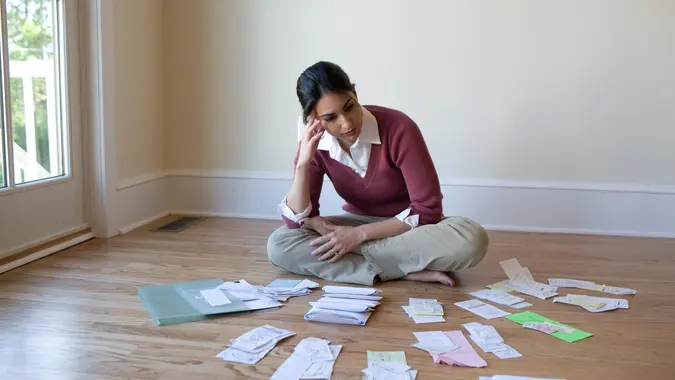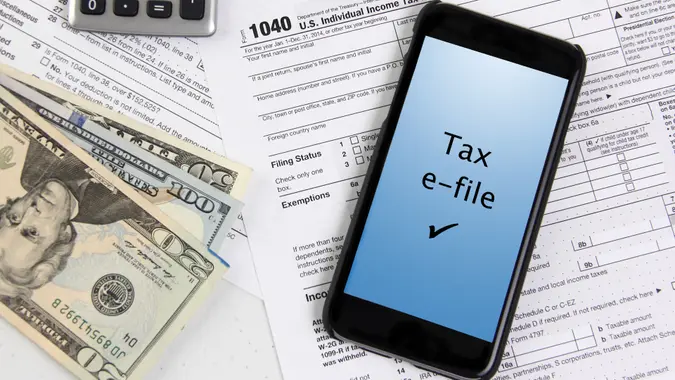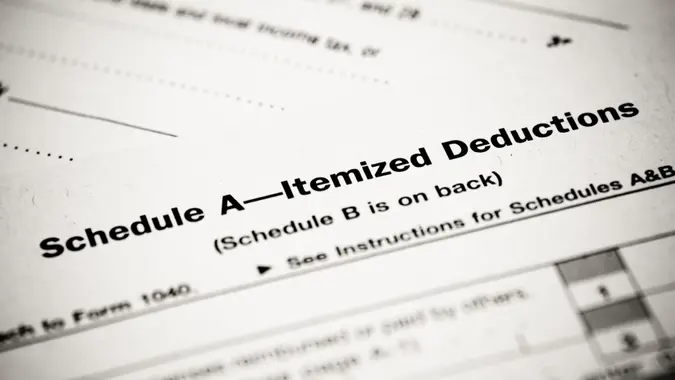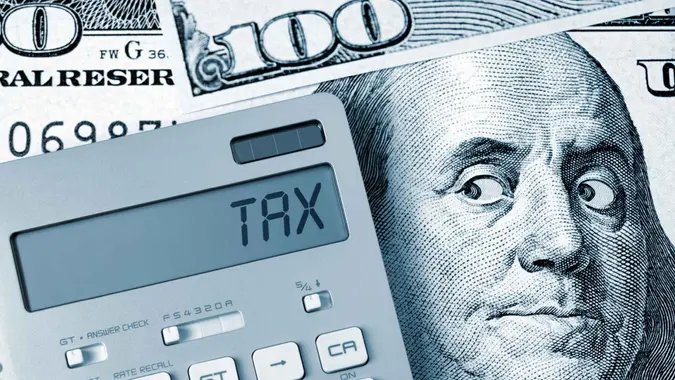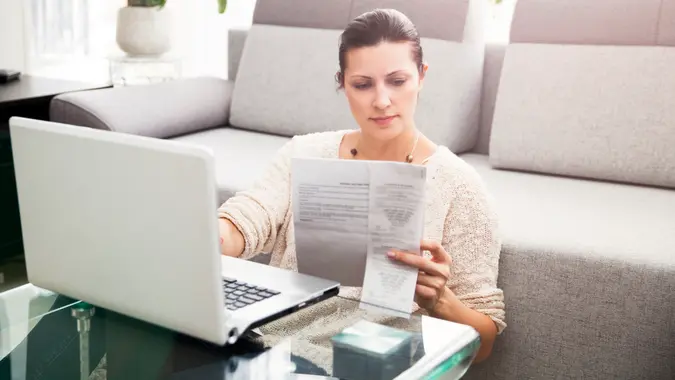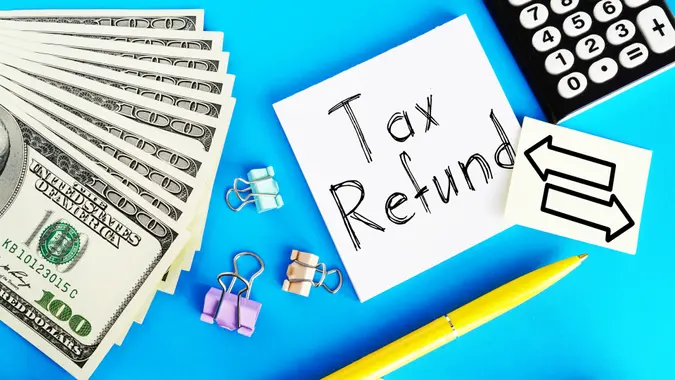1031 Exchange Rules: How To Defer Taxes When You Sell Investment Property

Commitment to Our Readers
GOBankingRates' editorial team is committed to bringing you unbiased reviews and information. We use data-driven methodologies to evaluate financial products and services - our reviews and ratings are not influenced by advertisers. You can read more about our editorial guidelines and our products and services review methodology.

20 Years
Helping You Live Richer

Reviewed
by Experts

Trusted by
Millions of Readers
A 1031 exchange is an IRS-approved strategy that lets real estate investors defer capital gains taxes when they sell an investment or rental property, as long as the proceeds are reinvested into another qualifying property. Instead of paying taxes at the time of sale, the gain is rolled into the new property, allowing investors to keep more money working for them while following strict IRS rules and timelines.
What Is a 1031 Exchange?
A 1031 exchange allows you to sell an investment or business-use property and reinvest the full proceeds into another “like-kind” property, all while deferring capital gains taxes.
You’re not avoiding taxes forever — but you’re postponing them, which gives you more capital to reinvest and grow your real estate portfolio.
Capital gains tax rates can be as high as 20% federally — plus state taxes — so deferring them can mean big savings.
When Can You Use a 1031 Exchange?
You may qualify for a 1031 exchange if:
- You’re selling real estate held for investment or business
- You’re reinvesting in another U.S.-based investment property
- You follow the IRS timelines and identification rules
- You use a qualified intermediary (more on that soon)
1031 Exchange Rules: What You Need To Know in 2026
| Rule | What It Means |
|---|---|
| Like-Kind Property | Both properties must be U.S.-based real estate held for business or investment purposes. |
| No Personal Use | Primary residences, second homes and vacation properties don’t qualify — even minimal personal use can disqualify the exchange. |
| Full Reinvestment Required | To defer all taxes, you must reinvest 100% of the sale proceeds into the replacement property. |
| No “Boot” Allowed | Receiving cash or other non-like-kind property (called boot) makes that portion taxable. |
1031 Exchange Timelines: 45 Days and 180 Days
Timing is everything with a 1031 exchange. The IRS has two hard deadlines you must follow — no exceptions.
| Rule | Requirement |
|---|---|
| 45-Day Rule | Identify potential replacement properties within 45 days of sale |
| 180-Day Rule | Close on your new property within 180 days of the original sale |
According to the IRS, missing either deadline means your exchange won’t qualify and you’ll owe taxes.
Identification Rules: 3-Property and 200% Rule
You have options when identifying new properties:
- 3-Property Rule: Name up to three potential replacement properties (any value).
- 200% Rule: Identify any number of properties, as long as their total value doesn’t exceed 200% of the property you sold.
These rules add flexibility, especially in hot markets where deals fall through or prices shift fast.
Types of 1031 Exchanges
There’s more than one way to structure a 1031 exchange. Here’s a quick breakdown:
| Type | What It Means |
|---|---|
| Simultaneous | Sell and buy happen on the same day. Rare and hard to pull off. |
| Delayed (Most Common) | You sell, then buy within the 45/180-day timeline using a qualified intermediary. |
| Reverse | You buy the new property first, then sell your old one. Complex and riskier. |
| Construction/Improvement | Use exchange funds to build or improve the new property. Must be done within 180 days. |
How To Complete a 1031 Exchange (Step-by-Step)
| Step | What To Do |
|---|---|
| 1. Hire a Qualified Intermediary | Choose a neutral third party to manage the exchange. Can’t be your agent, attorney or family member. |
| 2. Sell Your Investment Property | Proceeds must go directly to the intermediary, not to you. |
| 3. Identify a Replacement Property | Submit a written list of potential properties within 45 days of the sale. |
| 4. Close on the New Property | Complete the purchase within 180 days of selling your original property. |
| 5. Report the Exchange | File IRS Form 8824 with your tax return to report the exchange details. |
More than $100 billion in real estate was exchanged tax-deferred under Section 1031 in recent years, according to the National Association of Realtors.
Why Investors Use 1031 Exchanges
- Tax deferral: Defer capital gains and depreciation recapture taxes
- Portfolio growth: Reinvest the full amount into larger or better-performing assets
- Consolidation or diversification: Swap multiple properties for one, or vice versa
- Estate planning: If heirs inherit the property, they get a step-up in basis, which may eliminate deferred taxes
Common Mistakes To Avoid
- Missing deadlines (45 and 180 days)
- Taking cash or non-like-kind property (you’ll owe taxes on it)
- Trying to DIY the exchange (you must use a qualified intermediary)
- Using a property personally during the exchange period
When a 1031 Exchange Might Not Be the Best Move
A 1031 exchange isn’t always the right fit. You may want to skip it if:
- You need cash from the sale for other purposes
- You’re downsizing and don’t plan to reinvest the full amount
- You’re ready to pay taxes and reset your cost basis
Alternatives to 1031 Exchanges
- Opportunity Zone investments – Reinvest capital gains with tax advantages
- Installment sales – Spread out the tax bill over several years
- REITs (Real Estate Investment Trusts) – Get real estate exposure without direct ownership
- Primary residence exclusion – Exclude up to $250,000 (single) or $500,000 (married) in gains if it’s your home
Real-Life Example: How It Works
You sell a rental property for $800,000 and walk away with $250,000 in capital gains. Instead of paying taxes on that gain — which could easily exceed $50,000 once federal and state taxes are factored in — you roll the proceeds into another rental property using a 1031 exchange. The result? The tax is deferred, and more of your money stays invested and working for you.
Mastering 1031 Exchange Rules Can Save You Thousands
A 1031 exchange is one of the most powerful tax tools available to real estate investors — but it’s only effective if you follow the rules. From tight deadlines to strict reinvestment requirements, a single misstep can be costly.
Understanding the latest 1031 exchange rules can help you grow your portfolio, reduce your tax bill and build long-term wealth — all while keeping more of your capital working for you.
FAQ About 1031 Exchange Rules
Here are the answers to some of the most frequently asked questions about the IRS's 1031 exchange rules:- What is the 45-day rule in a 1031 exchange?
- You must identify your replacement property in writing within 45 days of selling your original property.
- Can I use a 1031 exchange for a vacation home?
- Only if the property has been used strictly for investment and meets IRS safe harbor rules — personal use is limited or disqualifying.
- What happens if I don’t reinvest all of the proceeds?
- You’ll pay capital gains tax on any leftover funds not reinvested — this is known as receiving “boot.”
- Can I exchange one property for multiple properties?
- Yes. As long as you follow the 3-property or 200% rule and close within 180 days.
- Do I need a qualified intermediary?
- Yes. Without one, the IRS will treat the sale as a taxable event — even if you reinvest the proceeds.
Daria Uhlig contributed to the reporting of this article.
Editorial Note: This content is not provided by any entity covered in this article. Any opinions, analyses, reviews, ratings or recommendations expressed in this article are those of the author alone and have not been reviewed, approved or otherwise endorsed by any entity named in this article.
Our in-house research team and on-site financial experts work together to create content that’s accurate, impartial, and up to date. We fact-check every single statistic, quote and fact using trusted primary resources to make sure the information we provide is correct. You can learn more about GOBankingRates’ processes and standards in our editorial policy.
- Rocket Mortgage "What Is A 1031 Exchange?"
- IRS "Like-Kind Exchanges Under IRC Section 1031."
- H&R Block "How Do I Calculate Cost Basis for Real Estate?"
- IRS "Part III Administrative, Procedural, and Miscellaneous."
- IRS "Topic no. 409, Capital gains and losses"
- IRS "About Form 8824, Like-Kind Exchanges"
- National Association of Realtors "Like-Kind Exchange"
 Written by
Written by  Edited by
Edited by 




